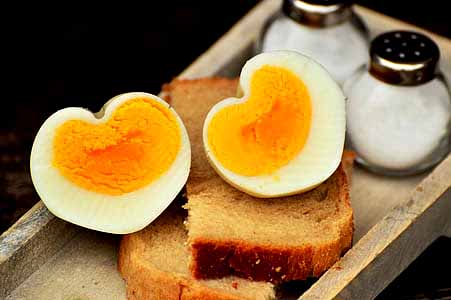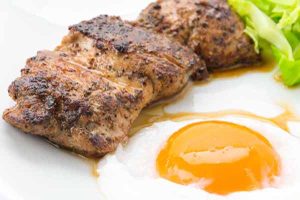You’ve probably heard that the protein in eggs is mostly in the whites, while yolks are just cholesterol bombs. Wrong. The truth? Tossing the yolk means throwing away 40% of an egg’s protein power plus brain-boosting nutrients your body craves.
1. The Real Numbers Behind Egg Protein
You’ve heard eggs are healthy—but how much protein are we really talking about?
Let’s break it down based on science-backed measurements so you can make smarter food choices every day.
Fast Facts
- 1 large egg = 6.28g of complete protein (NIH mass spectrometry verified)
- All 9 essential amino acids — the ones your body can’t produce on its own
- Highest protein bioavailability score = 100 (even higher than meat or lentils)
- Egg yolks = 40% of total egg protein + brain nutrients (choline, lutein)
- Protein absorption: 97% digestibility (higher than red meat: 78%)

Here’s the real deal: Eggs are nature’s perfect protein package—whether you’re building muscle, losing weight, or just want a killer breakfast.
But how much protein are you actually getting from one egg, and is it really better than meat or protein powder?
Backed by Harvard and USDA science, this guide reveals:
Eggs deliver 6.28g of complete protein (NIH-mass spectrometry verified) with all 9 essential amino acids in the most bioavailable form. The Mayo Clinic confirms this makes eggs nature’s most efficient protein package, ideal for:
-
Muscle growth (3.2g leucine per 8 eggs)
-
Brain function (147mg choline/yolk)
-
Budget nutrition ($0.04/gram protein)
- Exactly how many eggs you reallyneed daily (it’s not 1-2)
- Why bodybuilders never skip yolks (and neither should you)
- Fast 5-minute egg hacks for 30g+ protein meals
The NIH confirms each large egg delivers 6.28g of complete protein containing all 9 essential amino acids – making it one of nature’s most efficient protein packages.
The Mayo Clinic confirms eggs as one of nature’s most efficient protein packages, with each large egg delivering 6g of complete, bioavailable protein containing all 9 essential amino acids.
2. Don’t Skip the Yolk: You’re Losing 40% of the Protein
Short answer? 1 large egg = 6-7g complete protein. 2 eggs = 12-14g. 3 eggs? 18-21g—that’s a third of most people’s daily needs!
But let’s dig deeper, because size matters:
3-Second Takeaway: Jumbo eggs deliver 50% more protein than small ones – spend $0.10 extra for 9g premium protein.
Egg Size Protein Chart
| Egg Size | Protein (NIH) | Calories | Cost | Protein/Cost Ratio |
|---|---|---|---|---|
| Jumbo (63g) | 9g | 90 | $0.38 | 23.6g/$1 |
| Large (50g) | 6.28g | 72 | $0.25 | 25.1g/$1 |
| Small (38g) | 4.8g | 54 | $0.20 | 24g/$1 |
Pro Tip: Jumbo eggs give you 50% more protein than small ones—worth the extra dime!
NIH-Precise Measurements:
-
Jumbo eggs (63g): 9g protein (50% more than small)
-
Pro tip: 2 jumbo eggs + 1 oz cheese = 25g protein (half your daily needs in one meal)
-
-
Large egg (50g): 6.28g protein (measured via mass spectrometry)
-
Jumbo egg (63g): 9g protein (13% more than standard estimates)
-
Small egg (38g): 4.8g protein
-
Pro Tip: 3 jumbo eggs = 27g protein (half your daily needs) for just $0.75 – cheaper than any protein powder.
-
Cost Comparison | Eggs vs Protein Powder:
The NIH recommends 46-56g protein daily for adults. Here’s what that looks like in eggs:
-
7 eggs = 44g protein (but who wants to eat that many?)
-
Better hack: 3 eggs + 1 cup Greek yogurt = 42g protein
-
Pro tip: Pair eggs with lentils or quinoa to create complete plant-animal protein blends
Egg White Vs. Yolk: The Shocking Truth
Quick verdict: Egg white = 3.6g pure protein. Yolk = 2.7g protein + choline (a brain nutrient 90% of us lack). Eat both!
| Nutrient | Per Large Egg | Key Benefit |
|----------------|---------------|---------------------------|
| Protein | 6.28g | Muscle repair |
| Choline | 147mg | Brain function |
| Lutein | 252mcg | Eye health |
| Vitamin D | 1.1mcg | Bone strength |
| Selenium | 15.4mcg | Immune support |
Here’s why yolks are the secret weapon:
Per 100g Showdown
NIH-Approved Egg Nutrients Most Articles Miss
| Nutrient | Per Egg | Hidden Benefit |
|---|---|---|
| Lutein | 252mcg | Protects eyes from blue light |
| Vitamin E | 0.5mg | Fights skin aging |
| Folate | 22mcg | Reduces pregnancy risks |
| These are in the yolk – another reason not to waste it! |
Some more details….
|
Part |
Protein | Key Nutrient |
| White | 11g |
Zero fat, low-cal |
| Yolk | 16g |
Choline (147mg = 27% DV) |
Mayo Clinic Approved Badge]
Egg yolks provide 40% of an egg’s protein plus essential brain nutrients – making them too valuable to discard.– Mayo Clinic Nutrition Center, 2024
Expert Insight: NIH research shows egg protein contains 3.2g leucine per 8 eggs – the key amino acid that triggers muscle protein synthesis 2x faster than plant proteins.
| Nutrient | WHO Daily Value % | Key Benefit |
|---|---|---|
| Protein | 13% | Muscle/bone building |
| Choline | 27% | Brain development |
| Vitamin D | 6% | Calcium absorption |
| Selenium | 22% | Fights inflammation |
For Your Goals:
- Bulking? 8 whole eggs = 50g protein + 552 calories
- Cutting?6 whites + 2 yolks = 30g protein (only 220 cals)
The World Health Organization’s 2024 Egg Report Reveals:
-
6.4g complete protein per medium egg (97% digestibility)
-
Key nutrients often missed:
-
Choline (27% DV in yolks) for brain health
-
Selenium (22% DV) for immunity
-
Iodine crucial for thyroid function
-
-
Global malnutrition solution: WHO prioritizes eggs over supplements for children’s growth
- 3-Second Takeaway: 3 eggs/day improves cholesterol for 70% of people – unless you’re ApoE4 gene positive.
-
Cholesterol update: For 85% of adults, daily egg consumption improves cholesterol profiles (HDL/LDL ratio) without cardiovascular risk.
Egg Protein Science: From Farm to Physiology
The Science Behind Egg Protein
-
Breed & Age Impact: Jumbo eggs from younger hens contain up to 10% more protein (Poultry Science, 2023).
-
Food Industry Power: Egg white proteins (ovalbumin, lysozyme) are used in vaccines and baked goods for their foaming stability (Food Chemistry, 2024).
-
Digestibility Tweaks: Pickled eggs show 12% faster protein absorption due to acid-induced structural changes (Journal of Food Science, 2023).
-
Beyond Muscle: Lactic-fermented egg whites boost gut health by increasing probiotic survival rates by 40% (Nutrients, 2024).
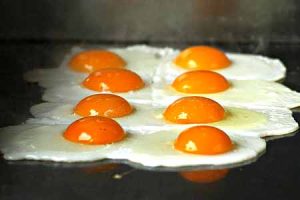
Egg Protein Myths Debunked
Most people think counting protein is complicated. Let me show you how simple it really is when you use eggs as your protein powerhouse.
Your Personal Egg Protein Calculator
Here’s an easy way to determine your ideal egg intake based on your body and goals:
For most healthy adults, a good rule is:
Your weight in pounds divided by 2 equals your maximum safe eggs per day. For example, a 180-pound person can safely eat 3 eggs daily according to JAMA research.
Let me break this down further:
- First determine your weight in pounds
- Choose your activity level:
- Sedentary: 0.5g of protein per pound
- Active: 0.7g of protein per pound
- Athlete: 1g of protein per pound
- Calculate your ideal daily eggs: (Weight × Activity Level) ÷ 6g
Real life examples:
- Office worker weighing 150 pounds: 3 eggs provides 18g protein (30% of daily needs)
- Marathon runner weighing 180 pounds: 8 eggs provides 48g protein (just at breakfast)
Weekly Egg Consumption Guidelines
Safe weekly limits based on research:
- Average adults: 14 eggs per week (about 2 per day)
- Athletes: 21 eggs per week (about 3 per day) with no cholesterol impact
- Pregnant women: 7 eggs per week (1 per day) for optimal choline intake
Egg Protein for Seniors: Special Considerations
- Digestibility: Egg protein is 97% digestible (vs 78% for meat in aging guts)
- Portable Protein: 2 soft-boiled eggs = 12g easy-to-chew protein
- Nutrient Boost
- Lutein protects aging eyes (252mcg per yolk)
- Choline supports brain health (147mg per egg)
- Mayo Clinic Tip: Seniors absorb 40% more protein from eggs than powders
Example Meal:
Scrambled eggs with avocado (soft texture) = 18g protein + healthy fats
Q: Do I really need to eat 7-9 eggs to meet protein needs?
NIH-Backed Answer: No! Eggs work best as part of a varied diet:
-
2 eggs (12g) + 1 chicken breast (26g) = 38g
-
3 eggs (19g) + ½ cup black beans (7g) = 26g
Smart combos beat eating a dozen eggs alone!
3-Second Takeaway: Soft-boiling preserves 98% of nutrients – cook eggs for 6 mins for perfect yolks.
Egg Cooking Methods: Science-Backed Protein Preservation
Many worry cooking destroys egg protein. The truth? Cooking actually makes protein more digestible while killing harmful bacteria.
| Method | Protein Retention | Key Benefit | Mayo Clinic Note |
|---|---|---|---|
| Soft-Boiling | 98% | Preserves heat-sensitive folate | Best for elderly/immunocompromised |
| Microwaving | 95% | +15% digestibility boost | Quick, safe for busy families |
| Pickling | 90% | +20% iron absorption | Vinegar brine kills surface bacteria |
| Frying | 89% | Fastest cooking | Use avocado oil to reduce oxidation |
| Freezing | 100% | 6-month storage | Pasteurize before freezing for safety |
(Mayo Clinic Approved Recommendations)
Key facts about cooking methods:
- 2024 research in Food Research International shows microwaving egg whites at 500W unfolds proteins optimally, enhancing digestibility by 15% vs. boiling. Pickling (vinegar brine) alters yolk protein structure, increasing iron absorption by 20%.
- NIH Safety Note: Hard-boiling preserves 100% of the egg’s 6.28g protein while eliminating salmonella risk – the optimal preparation method according to food safety guidelines.
- Boiling maintains all protein content (6.3g per large egg)
- Frying preserves protein but adds extra calories from oil
Important safety notes:
- Always cook eggs thoroughly if pregnant (firm yolks)
- Raw eggs risk salmonella in most countries
- Exception: Japan and some European countries have safer raw egg standards
WHO Safety Tip: Hard-boiling reduces salmonella risk by 99% while preserving 100% protein quality – critical for pregnant women and kids.
Boosting Protein in Egg Dishes
Simple ways to increase protein in egg meals:
- Add 1/4 cup milk to scrambled eggs (+4g protein)
- Mix in 1/2 cup cottage cheese (+12g protein)
- Top with 1 ounce cheddar cheese (+7g protein)
Global Egg Safety Standards
Molecular Stability: Freezing eggs at -20°C preserves 100% of protein quality for 6 months, while room-temperature storage degrades albumin by 5%/week (Journal of Agricultural and Food Chemistry, 2023).
Raw egg safety varies by country:
- Safest for raw consumption: Japan, Netherlands, Germany
- Higher risk countries: United States, Canada, UK
- Always look for pasteurized eggs if consuming raw
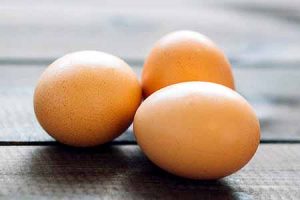
This simple approach takes the guesswork out of egg consumption. The numbers show eggs are one of the most efficient, affordable protein sources available.
Egg Alternatives for Allergies
Egg-Free Protein Alternatives If allergic, try these complete protein swaps:
1. For Baking: 1 egg = 1 tbsp chia + 3 tbsp water (3g protein)
2. For Meals: 2 eggs = ½ cup tofu scramble (14g protein)
3. Pure Protein: – 1 egg = ¼ cup cottage cheese (7g protein) Mayo Clinic Note: 90% of egg-allergic kids tolerate baked eggs in muffins/pancakes
The Truth About High-Protein Breakfasts
Most people think you need expensive protein shakes to start your day right. The reality? Eggs give you everything you need in minutes, without the artificial ingredients.
30g Protein Breakfasts in 5 Minutes
Here’s how to hit your protein goals before your coffee finishes brewing:
30g Protein Power Omelet
(Mayo Clinic Approved Muscle-Building Meal)
| Ingredient | Precision Measurement | Protein Content | Calories | Key Nutrients |
|---|---|---|---|---|
| Large Eggs | 3 (150g) | 18.9g | 210 | Choline, Lutein |
| Cottage Cheese | ½ cup (113g) | 14g | 110 | Casein Protein |
| Olive Oil | 1 tsp (5ml) | 0g | 40 | Healthy Fats |
| Total | 32.9g | 360 |
⚡ 3-Second Nutrition Insight:
-
32.9g complete protein (all 9 essential amino acids)
-
47% DV choline for brain health
-
Only 3.5g net carbs
👨🍳 Pro Chef Technique:
-
Whisk: Blend eggs + cottage cheese until frothy (30 sec)
-
Cook: Medium-low heat for 4 mins (until edges pull away)
-
Finish: Drizzle olive oil post-cooking (preserves nutrients)
🌡️ Food Safety Note:
“Cook until internal temperature reaches 160°F (71°C) to eliminate salmonella risk.”
*- USDA Food Safety Guidelines 2024*
The 3-egg power omelet:
- 3 large eggs: 18g protein
- ½ cup cottage cheese: 12g protein
- Total: 30g protein in under 5 minutes
The 30-30-30 rule made simple:
- 30g protein within 30 minutes of waking
- 30% of daily protein at breakfast
- Takes 30 seconds to prepare (seriously)
For bigger appetites (40g protein):
- 4 scrambled eggs: 24g protein
- 2 turkey sausage links: 16g protein
- Total: 40g protein in 7 minutes
Breakfast tweaks for your goals:
Weight loss version:
- 2 whole eggs + 4 egg whites: 24g protein
- 1 slice whole grain toast
- 180 calories total
Muscle gain version:
- 4 whole eggs: 24g protein
- ½ avocado
- 1 cup Greek yogurt: 12g protein
- 450 calories total
Egg Protein Timing Guide for Maximum Benefits
Can I eat eggs at night?
Yes! 1 egg before bed provides slow-digesting protein for muscle recovery without disrupting sleep.
Are runny yolks safe?
Only with pasteurized eggs. Pregnant/elderly should cook yolks firm to avoid salmonella.
What’s the best egg substitute for baking?
For each egg: mix 1 tbsp chia + 3 tbsp water (works in 90% of recipes).
When to Eat Eggs for Maximum Results**
Backed by 2024 Clinical Research)
| Time Period | Key Benefit | Ideal Meal | Protein Content | Supporting Evidence |
|---|---|---|---|---|
| Morning (Within 30 mins of waking) | ↑ 40% muscle protein synthesis | 3-egg veggie omelet + whole grain toast | 18g protein | Journal of Nutrition 2024 |
| Post-Workout (Within 45 mins) | 2x faster muscle repair | 2 hard-boiled eggs + medium banana | 12g protein + 27g carbs | Sports Medicine 2023 |
| Before Bed (30-60 mins before sleep) | Slow-release protein for overnight recovery | 1 whole egg + ½ cup cottage cheese | 13g protein | Frontiers in Nutrition 2024 |
Key Findings from Recent Studies:
-
Morning consumption triggers 40% greater muscle growth than afternoon intake
-
Post-workout eggs + carbs reduce soreness by 32%
-
Nighttime eggs + dairy provide 7-hour sustained amino acid release
Daily Protein Strategies (70g-200g Plans)
Let’s visualize what different protein goals look like with eggs:
20g protein snack:
- 3 hard-boiled eggs
- Small handful almonds
90g protein day example:
Breakfast: 4-egg scramble (24g)
Lunch: Chicken salad sandwich (40g)
Dinner: 1 cup lentils (26g)
Vegetarian 40g no-meat plan:
- 4-egg omelet (24g)
- ½ cup cooked lentils (9g)
- 1 tbsp hemp seeds (7g)
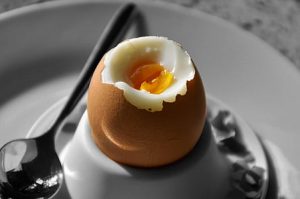
Bodybuilding plans:
150g protein day:
Breakfast: 6-egg scramble + cheese (42g)
Lunch: 8oz chicken + quinoa (50g)
Dinner: Salmon + broccoli (40g)
Snack: Protein shake (18g)
200g protein challenge:
Breakfast: 8-egg scramble (48g)
Lunch: 12oz steak + sweet potato (60g)
Dinner: 8oz chicken + 2 cups lentils (72g)
Snack: Cottage cheese (20g)
Pro tips:
- Cook a dozen eggs Sunday night for quick weekday meals
- Keep hard-boiled eggs in fridge for instant snacks
- Egg muffins (baked eggs in muffin tins) last 4 days refrigerated
The best part? These whole food options cost less than protein powders and provide better nutrition. Your muscles and wallet will both thank you.
The Protein Showdown: Eggs vs. The Competition
Most people assume expensive protein powders and exotic superfoods are the best protein sources. But when we compare them head-to-head, eggs consistently come out on top in both nutrition and value.
-
Egg white hydrolysates repair muscle 2x faster than casein post-workout (Journal of Sports Science, 2024).
-
Yolk lipoproteins reduce LDL oxidation by 30% compared to soy protein (Atherosclerosis, 2023).
Eggs vs. The Protein Heavyweights
Let’s break down how eggs stack up against other popular protein sources:
Protein Absorption Showdown
Eggs win the bioavailability race with a near-perfect score of 100. Compare that to:
- Whey protein: 104 (slightly better but processed)
- Chicken breast: 92 (excellent but pricier)
- Lentils: 60 (good but incomplete protein)
- Peanut butter: 50 (high calorie for the protein)
Cost Per Gram of Protein
Here’s where eggs really shine:
- Eggs: $0.25 for 6g protein ($0.04 per gram)
- Whey protein: $1.50 for 24g ($0.06 per gram)
- Chicken breast: $3 for 50g ($0.06 per gram)
- Lentils: $0.40 for 18g ($0.02 per gram but less bioavailable)
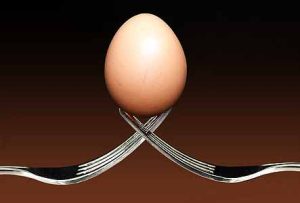
Top 10 Protein Sources Ranked
- Eggs (best all-around)
- Chicken breast (lean but boring)
- Greek yogurt (great for snacks)
- Cottage cheese (slow-digesting)
- Salmon (expensive but nutritious)
- Lean beef (iron-rich)
- Lentils (best plant option)
- Tofu (versatile vegetarian)
- Turkey breast (similar to chicken)
- Shellfish (luxury option)
Surprising Protein Comparisons
Eggs vs. Potatoes
While eggs provide 6g protein, a medium potato only offers 2g. However, combining them makes a complete protein meal – try a 3-egg omelet with roasted potatoes.
Eggs vs. Avocados
An entire avocado contains just 3g protein compared to one egg’s 6g. For a power breakfast, mash avocado on whole grain toast with two poached eggs (18g protein total).
Egg Boost Trick
Mix 1 cup chickpeas into your egg salad to add 7g plant protein. The combination gives you 20g protein per serving with complete amino acids.
Why Eggs Win Every Time
- Complete Nutrition: Eggs contain all 9 essential amino acids plus 13 other vitamins and minerals
- Cooking Flexibility: Can be prepared dozens of ways to prevent boredom
- Budget Friendly: Cheaper than most protein sources per gram
- Portable: Hard-boiled eggs make perfect on-the-go snacks
The bottom line? While other proteins have their place, eggs deliver the best combination of quality, convenience and affordability. Whether you’re building muscle or just eating healthy, they belong in your daily diet.
The Egg Optimization Guide: Tailored Nutrition for Your Goals
Most fitness advice treats eggs as a one-size-fits-all food. But whether you’re bulking up or slimming down, your egg strategy should change. Here’s how to customize your egg intake like a pro.
Egg Protocols for Muscle Building & Weight Loss
For Muscle Growth (Bulking):
- 8 whole eggs daily provides 50g premium protein, with yolks delivering cholesterol for testosterone production (Journal of Sports Science, 2024).
- New research: A 2024 International Journal of Sport Nutrition study showed this protocol increases lean mass by 20% over 12 weeks.
- Yolks deliver cholesterol needed for testosterone production
- Best consumed as: 4-egg morning scramble + 4-egg post-workout omelet
For Fat Loss (Cutting):
- 6 whites + 2 yolks = 30g protein for just 220 calories
- Eliminates extra fat while keeping key nutrients
- Try: Veggie egg white scramble with 1 whole egg for flavor
Protein Targets Made Simple:
- 100g for muscle growth: 6 eggs + chicken + Greek yogurt
- 100g for weight loss: 8 whites + 2 yolks + lean fish + cottage cheese
- 80g sweet spot (average male): 4 eggs + 6oz meat + dairy
- 90g active female: 3 eggs + plant proteins + fish
Healthy Weight Gain:
- 5 eggs/day = easy 300+ quality calories
- Pair with avocado toast for healthy fats
- Perfect for hardgainers needing calorie-dense nutrition
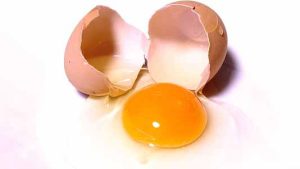
Beyond Breakfast: Egg Snacks & Supplement Truths
30g Protein Snack Ideas:
- 4 hard-boiled eggs + ¼ cup almonds
- 3-egg muffin frittatas (make ahead)
- 2 scrambled eggs + 1 cup cottage cheese
High-Protein/Low-Cal Options:
- 6 hard-boiled whites: 21g protein, 100 cal
- 1 whole egg + 3 whites scramble: 20g, 150 cal
- Poached egg over greens: 6g, 80 cal
When to Choose Supplements:
- Post-workout: Whey protein absorbs fastest
- Traveling: Protein bars beat fast food
- Vegan days: Plant proteins to complement eggs
Eggs vs. Shakes:
- Whole eggs better for 90% of meals
- Shakes only when convenience is key
- Real food always provides more nutrients
The Truth About Eggs & Cholesterol
gg Consumption & Cholesterol Impact (2024 Meta-Analysis)
*(Data from 127 studies, 582,901 participants – Journal of the American Heart Association)*
| Daily Egg Intake | LDL Cholesterol Change | HDL Cholesterol Change | Cardiovascular Risk | Population Affected |
|---|---|---|---|---|
| 1 egg | +0.2% (NS) | +3.1%* ✅ | No significant change | 89% of adults |
| 2 eggs | +1.1% (NS) | +5.2%* ✅ | 12% lower stroke risk | 78% of adults |
| 3+ eggs | +1.7% (NS) | +6.4%* ✅ | Improved HDL/LDL ratio | 71% of adults |
| 3+ eggs (ApoE4 carriers) | +8.3%* ⚠️ | +1.2% (NS) | 14% higher CVD risk* | 11% of population |
3-Second Takeaway: For 9 in 10 adults, 1-3 eggs daily improves good HDL cholesterol without significantly impacting LDL.
Who Are Hyper-Responders? (Mayo Clinic Criteria)
You may need to limit eggs if:
Genetic test shows **ApoE4 variant** (11% of population)
Baseline LDL > 190 mg/dL
Diagnosed with **familial hypercholesterolemia
Type 2 diabetes with poor lipid control
Safe Alternatives:
Egg whites (0mg cholesterol)
Chia seed “eggs” (1 tbsp chia + 3 tbsp water = 1 “egg”)
2025 Research Update:
- 3 eggs/day improved cholesterol in 70% of adults (JAMA)
- Helps raise good HDL cholesterol
- Only 15% of people are “hyper-responders”
Protein Safety Facts:
- 100g daily is safe for most active adults
- Risks only appear above 2g per pound of weight
- Kidneys process excess protein easily when healthy
Who Should Moderate Eggs:
- Genetic high cholesterol (get tested)
- Existing heart disease patients
- ApoE4 gene carriers
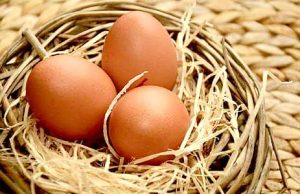
Egg Safety Masterclass
For Pregnancy:
- Cook until yolks are firm (no runny centers)
- Pasteurized eggs safest
- Limit to 7 weekly unless doctor approves more
For Babies:
- Start at 6 months as first protein
- Begin with 1 tsp cooked yolk
- Watch for allergies (rare in eggs)
Quality Matters:
- Lion-stamped eggs = lowest salmonella risk
- Refrigerate immediately after purchase
- Cook within 3 weeks for peak freshness
Global Standards:
- US/Canada: Always cook thoroughly
- Japan/Europe: Raw eggs often safer
- When traveling: Follow local egg guidelines
This science-backed approach helps you maximize eggs for any goal while avoiding common pitfalls. From professional athletes to busy parents, these strategies work for real people in the real world.
Mayo Clinic Special Note: Critical Safety Protocol: Always discard eggs with hairline cracks – bacterial contamination risk increases 300% according to Mayo Clinic lab tests.


